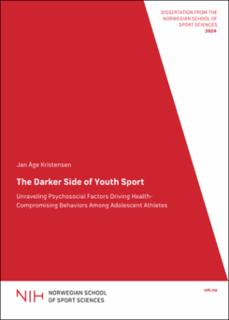| dc.contributor.author | Kristensen, Jan Åge | |
| dc.date.accessioned | 2024-03-06T08:26:59Z | |
| dc.date.available | 2024-03-06T08:26:59Z | |
| dc.date.issued | 2024 | |
| dc.identifier.isbn | 978-82-502-0620-5 | |
| dc.identifier.uri | https://hdl.handle.net/11250/3121187 | |
| dc.description | Avhandling (doktorgrad) - Norges idrettshøgskole, 2024 | en_US |
| dc.description.abstract | Background: The overall aim of this research project was to increase understanding of the psychosocial factors that influence health-compromising behaviors among young athletes. To achieve this, an integrative social cognitive approach was adopted by deepening and broadening the theory of planned behavior (Ajzen, 1991). Health-compromising behaviors encompassed painkiller use, participation in sports despite injuries, use of dietary supplements, and doping. A range of theoretically informed personal and contextual factors were hypothesized to either offer protection against or trigger these behaviors. By providing a better understanding of these factors, this thesis contributes to the development of strategies for reducing health-compromising behaviors in youth sports.
Objectives: To achieve the overall aim of this doctoral thesis, four studies were conducted, each of which targeted a specific objective. These four objectives were: (Paper I) identify the personal and contextual factors influencing athletes’ health-compromising behaviors through a systematic review; (Paper II) examine the relationship between perceived social pressure and intention to play through injuries; (Paper III) explore the interplay between perceptions of a performance climate and doping temptation antecedents, while also examining the moderating role of perfectionistic concerns; and (Paper IV) investigate the mediating role of the acceptance of dietary supplements in the relationship between supplement use and doping attitudes during a competitive season.
Methods: The four individual studies encompassed both qualitative (Paper I) and quantitative research designs (Papers II, III, and IV). In Paper I, a systematic mixed-studies review was conducted, synthesizing and analyzing qualitative, quantitative, and mixedmethods studies. Exploratory data analysis combined convergent qualitative meta-integration and thematic analysis to interpret emerging themes and patterns. Paper II employed parallel multiple mediation analysis with cross-sectional data to examine whether social pressure was directly and indirectly (via attitudes, subjective norms, perceived behavioral control avoidance, and situational temptation) related to the intention to play when injured (N = 186 junior ice hockey players). Paper III utilized conditional process analysis with cross-sectional data to explore whether the performance climate was directly and indirectly (via pro-doping attitudes) related to doping temptation, while also considering the moderating role of perfectionistic concerns (N = 420 adolescent athletes). Paper IV employed structural equation modeling analysis with a half-longitudinal data collection approach in a two-wave design to test the mediating role of dietary supplement acceptance in the relationship between supplement use and doping attitudes during a competitive season (N = 217 adolescent athletes).
Results and discussion: The findings indicate that there is a dynamic interplay between the personal factors of the athletes and the contextual factors summarized from athletes’ selfdescribed perceptions of the sporting environment, which shapes their health-compromising behaviors (Paper I). A wide range of theoretically informed personal and contextual factors, functioning either as protective or eliciting factors, were identified. Ice hockey players perceived social pressure from the sporting environment to play despite being injured (Paper II). This perception appeared to increase players’ intention to play through injuries. Additionally, the players’ perception of social pressure seemed to influence their attitudes, subjective norms, and situational temptations, thereby strengthening their intention to play the game when injured. Furthermore, athletes who perceived their sports environment as performance-oriented, characterized by an increased pressure to win and outperform others, were more likely to be tempted to use prohibited substances. Perceptions of a performanceoriented climate also appeared to shape athletes’ beliefs that using prohibited substances would yield more positive consequences than negative ones, making them more prone to doping. This tendency was particularly notable among athletes who had moderate or high levels of perfectionistic concerns (Paper III). Finally, dietary supplements were widely used among young athletes. However, the frequent use of supplements might be a potential ris factor for developing pro-doping attitudes. The findings suggest that when athletes used dietary supplements at the start of the season to improve their performance, they were more likely to view the use of supplements as acceptable and to report more favorable attitudes toward doping six months later at the end of the season (Paper IV).
Conclusion: In summary, the overall findings highlight important psychosocial factors underlying young athletes’ health-compromising behaviors. Thus, the findings also underline the role of the sporting environment in helping athletes refrain from dysfunctional behavioral patterns. Coaches, sports practitioners, and others are encouraged to create environmental conditions that reduce social pressure and downgrade the importance of winning. | en_US |
| dc.language.iso | eng | en_US |
| dc.relation.haspart | Paper I: Kristensen, J. Å., Skilbred, A., Abrahamsen, F. E., Loland, S. & Ommundsen, Y. (2022). Performance-enhancing and health-compromising behaviors in youth sports: A systematic mixed-studies review. Published in Performance Enhancement & Health, 10(4), 1–12. https://doi.org/10.1016/j.peh.2022.100237. | |
| dc.relation.haspart | Paper II: Kristensen, J. Å., Haugen, T. & Ommundsen, Y. Perceived social pressure and intention to play through injuries in junior ice hockey: The sporting environment matters.
Accepted for publication in Journal of Sports Sciences. | |
| dc.relation.haspart | Paper III: Kristensen, J. Å., Kavussanu, M. & Ommundsen, Y. Perceived performance climate, doping attitudes and temptation among elite youth athletes: Exploring the moderating role of
perfectionistic concerns. Submitted to European Journal of Sport Science. | |
| dc.relation.haspart | Paper IV: Kristensen, J. Å., Haugen, T. & Ommundsen, Y. Supplement usage and doping attitudes in elite youth sports: The mediating role of dietary supplement acceptance. Submitted to PLOS ONE. | |
| dc.subject | nih | en_US |
| dc.subject | doktoravhandlinger | en_US |
| dc.title | The darker side of youth sport: Unraveling psychosocial factors driving health - compromising behaviors among adolescent athletes | en_US |
| dc.type | Doctoral thesis | en_US |
| dc.description.version | publishedVersion | en_US |
| dc.description.localcode | Institutt for idrett og samfunnsvitenskap / Department of Sport and Social Sciences | en_US |
